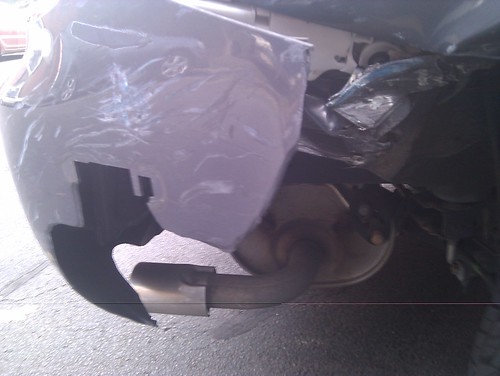
Photo: My poor little car.
So I had a car crash outside the office the other day. Nobody was hurt, but my car is going to be in the shop for a while. I was turning left into the parking lot, yielded on a green light, but didn’t see the other guy who was motoring on through the lights in a car with dealer plates on because he was obscured by a very large construction truck. He hit me at the passenger-side rear of the car, taking out the bumper, side panel, and at least hurting the alignment. I don’t consider the accident my fault, but I’m pretty sure the state of Massachusetts will, since I was making a left turn (this being number 15 on the list of findings of fault they prescribe). To add insult to injury, I was given a “failure to yield” warning (by an officer who turned up after the event) that I contend was not the case but cannot legally appeal because there is no penalty associated with this (unless I get a second ticket in the next twelve months).
Not having had a crash before (other than hitting a cow in a rental some years ago), and therefore not knowing any good body shops, I took the car to an insurer recommended facility in Cambridge (it was drivable, but I kept it to under 40 all the way home to avoid any of the panels becoming further damaged). This being the US, and therefore generally irrationally fearful of government or regulation in general, we have no good consumer standards agencies run by the federal or state government (BBB doesn’t count), so it’s really the Wild West when it comes to knowing if a body shop is any good. Private companies like Yelp try to solve a problem that should be solved at the national level and can only provide some data points to feed into a decision. The body shop seems ok, but their state filings show that they moved from Brighton to Cambridge earlier this year (why was that?) and that they’ve paid fines several years in a row for being late filing (but is that even unusual when it comes to this kind of place? does that mean anything other than that they fix cars but aren’t trained lawyers or accountants?). In the end, all I could go on was the advice of the insurer, my inclination that the damage wasn’t hugely structural, and the professionalism of the person that I spoke with on the phone and subsequently met in person when I dropped the car off. Anyway, I hope that works out ok.
In the wake of this accident, I’ve had several ideas for rather diabolical (but legal) means to avoid a repeat, and certainly to avoid being accused of failing to yield or acting other than in an exemplary fashion at all times. This will involve a large quantity of sensors, cameras, and computing power installed in the car when I get it back again.
Jon.